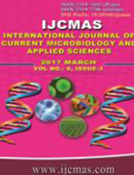


 National Academy of Agricultural Sciences (NAAS)
National Academy of Agricultural Sciences (NAAS)

|
PRINT ISSN : 2319-7692
Online ISSN : 2319-7706 Issues : 12 per year Publisher : Excellent Publishers Email : editorijcmas@gmail.com / submit@ijcmas.com Editor-in-chief: Dr.M.Prakash Index Copernicus ICV 2018: 95.39 NAAS RATING 2020: 5.38 |
The present study was conducted to assess the antimicrobial potential and phytochemical analysis of Aloe vera (Aloe barbadensis Miller) leaves extracts.The extracts were prepared by the sequential cold maceration method by using hexane, ethyl acetate, methanol and distilled water as a solvent. Antimicrobial activity of four extracts was performed by agar well diffusion method against different bacteria and fungi. Determination of Minimum Inhibitory Concentration (MIC) of different extracts, Thin Layer Chromatography (TLC), TLC bioautography and qualitative phytochemical analysis were also performed.The antimicrobial activity of A. barbadensis leaves extracts was found maximum against S. marcescens with a Zone of Inhibition (ZOI) of 13.67±0.57mm by hexane extract.The MIC of different extracts ranged between 6.25 and 50.00 mg/ml. Among all the fungi used in the study, all the three Aspergillus species were slightly inhibited by the specific extracts. The finding of TLC bioautography showed that compounds eluted at Rf 0.65 demonstrated strong antimicrobial activity whereas compounds eluted at Rf0.41 and Rf 0.82 exhibited moderate antimicrobial activity against S. marcescens. Phytochemical analysis indicated the presence of phytochemicals present in various extracts. The results of the investigation clearly indicate that A. barbadensis leaves extract have a potential antimicrobial activity against various microorganisms due to the presence of various phytochemicals.
 |
 |
 |
 |
 |